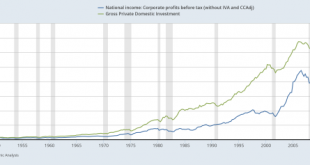from David Ruccio “When I use a word,” Humpty Dumpty said in rather a scornful tone, “it means just what I choose it to mean—neither more nor less.” “The question is,” said Alice, “whether you can make words mean so many different things.” “The question is,” said Humpty Dumpty, “which is to be master—that’s all.” Alice in Wonderland (pdf) is the key to understanding much of what is happening in the world today—especially the language of economics. For example, we’re going to hear and read...
Read More »What is wrong with economic theory
from Lars Syll “A wonderful set of clearly written and highly informative essays by a scholar who is knowledgeable, critical and sharp enough to see how things really are in the discipline, and honest and brave enough to say how things are. A must read especially for those truly concerned and/or puzzled about the state of modern economics.”Tony Lawson Table of Contents Introduction What is (wrong with) economic theory? Capturing causality in economics and the limits of statistical...
Read More »Houston, Bangladesh, and Global Warming
from Dean Baker We are seeing many terrible pictures from Houston as a result of Hurricane Harvey. People with young children and pets are wading through high water in the hope of being rescued by boat or helicopter. Elderly people in nursing homes are sitting in waist high water waiting to be rescued. It’s a pretty horrible story. One thing we can feel good about is that because the United States is a wealthy country, we do have large numbers of boats and helicopters and trained rescue...
Read More »Slick maneuvers
from David Ruccio Corporate duplicity, it seems, knows no bounds. First, ExxonMobil misled the public about climate change for years, even as its research echoed the growing scientific consensus that global warming is real and caused by human activity. Then, while various states attorneys-general launched investigations of whether Exxon deceived shareholders and the public to protect its profits, the Wall Street Journal published 21 opinion pieces about current or potential Exxon...
Read More »On Hayek and digital currencies
from Maria Alejandra Madi In the book Denationalisation of Money- the Argument Refined (1976), Hayek proposed the abolition of the government’s monopoly over the issue of fiat money in order to prevent price instability. In fact, his defense of a complete privatization of money supply stemmed from his disappointment with central banks’ management, which, in his opinion, had been highly influenced by politics. Thus, the ultimate objective of the denationalisation of money advocated by...
Read More »On the limits of game theory
from Lars Syll Back in 1991, when yours truly earned his first PhD with a dissertation on decision making and rationality in social choice theory and game theory, I concluded that “repeatedly it seems as though mathematical tractability and elegance — rather than realism and relevance — have been the most applied guidelines for the behavioural assumptions being made. On a political and social level, it is doubtful if the methodological individualism, ahistoricity and formalism they are...
Read More »The Indian Economy: 70 years after Independence
from C. P. Chandrasekhar The defining feature of the economic programme of independent India’s first government was to accelerate the transition to a modern economy dominated by industry. Agriculture and related activities at that time accounted for around half of GDP and modern industry in the form of factory establishments for just above 6 per cent. Thus, colonial rule had made India the victim of the barriers to productivity increase typical of predominantly agrarian economies. These...
Read More »Trading in Myths
from Lars Syll Pretending that the distribution of income and wealth that results from a long set of policy decisions is somehow the natural workings of the market is not a serious position. It might be politically convenient for conservatives who want to lock inequality in place. It is a more politically compelling position to argue that we should not interfere with market outcomes than to argue for a system that is deliberately structured to make some people very rich while leaving...
Read More »Slick maneuvers
from David Ruccio Corporate duplicity, it seems, knows no bounds. First, ExxonMobil misled the public about climate change for years, even as its research echoed the growing scientific consensus that global warming is real and caused by human activity. Then, while various states attorneys-general launched investigations of whether Exxon deceived shareholders and the public to protect its profits, the Wall Street Journal published 21 opinion pieces about current or potential Exxon...
Read More »Media’s biased reporting on China serves only the rich and powerful
from Dean Baker This month, a leading newspaper ran a column bashing China by two former U.S. intelligence officials. The piece claimed that the United States loses $600 billion a year due to “intellectual property theft” and that “China accounts for most of that loss.” This was striking for two reasons. First, the number is obviously absurd. Reputable news outlets usually make writers provide some backup for the numbers they use. That doesn’t seem to have been the case here. Second, if...
Read More » Real-World Economics Review
Real-World Economics Review






